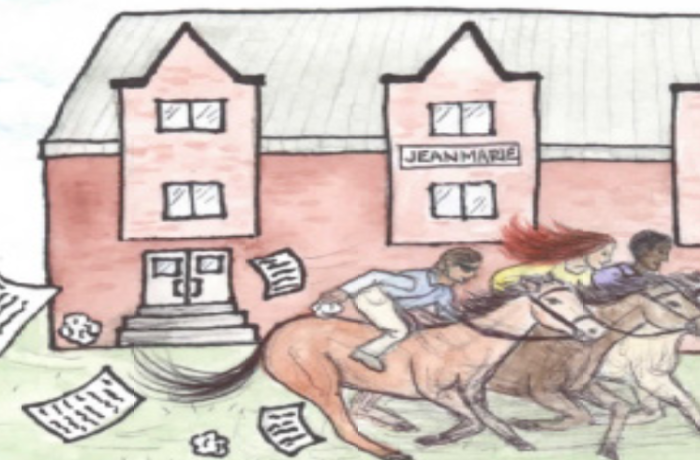
Coming off a stressful semester, Alex Muskat ’19, decided it was more beneficial to keep her emotion-al support animal, Winnie, home in New Hampshire than with her here on campus. Last semester her busy schedule meant she couldn’t give her pup enough time and she didn’t want that kind of stress to fall onto Winnie again. As more and more dogs come to cam- pus as emotional support animals and in therapy roles, animal advocates say their human companions need to think along those same lines of protection.
Dogs can provide a great bene t to many students in easing their stress levels, but what about when dogs get stressed by neglect from busy student schedules or loud, late parties, or too much attention? This environment is very different from the one they may know at home. It is important to take into consideration other ESA dogs on campus whose patterns may not be the same as your dog’s.
“Not all pooches love smooches, ” said Deb Helfrich, owner and co-founder of Gold Star Dog Training in Fairfax Vt, who has studied just how to tell when our dogs are trying to tell us what is wrong.
After a conflict or stressful encounter, a dog will shake off or yawn in response to releasing tension, similar to the way we take a deep breath when we get overwhelmed. The eyes are the most telling part on a dog. It is also important to note that a tail wag does not always mean to approach a dog. If the tail is upright and stiff, it usually indicates arousal, awareness, or stress. Oftentimes a dog will lower its tail and do a kind of swoop indicating every- thing is all good. However, certain breeds like the cocker spaniel, don’t really have a long tail so you really have to watch the body language.
As far as animals being on campus, the man that handles the tail-end of the process is Brian Lee, Assistant Dean of Students. To have a support animal on campus, students need to go through a number of steps. First you talk with Mary Masson of Bergeron Wellness Center about getting a recommendation from an
off campus therapist. Then the animal has to be ok’d by everyone that would be living with the animal, like room- mates. Finally, you reach the part of the process that Brian Lee handles, the approval and your name on the master list. Once you have been approved, you are good to go for your time at Saint Michael’s College.
Are there any regular check-ins to see how the animal doing? “There is an informal process that handles situations like that,” Lee said. “These students that have been approved are ones that we see regularly and talk with to see how everything is going. We hope that if things ever become too stressful the student will step for- ward and we can help.” Alex Muskat thought check-ins are more beneficial for everyone in the situation, even if it is just by email. “These check-ins, no matter how informal, are beneficial. They alert the college to any potential problems. As well, the roommates can alert both the owner and the college of any problems that may not have been apparent beforehand.”
Lee said there have been very little complaints from roommates on issues with ESAs, even if there were to be one, housing does what they can to come up with a solution. “We rarely have a living situation that doesn’t work out. If the roommates should change their mind, or it just isn’t work- ing in that particular arrangement, we will find the student somewhere it will work out.” The input of even the students who don’t need an emotional support animal is important too, Lee said. “We want these students successful; if an emotional support animal is what will help them succeed then we will help with that. If those without the need of these animals are having problems, we want to work with them too. We want it to work for everyone.”
While the role of an ESA is to help students out, their well-being is top priority. Muskat says that even though having Winnie on campus is a huge help with her anxiety and stress, its Winnie’s well-being that comes first. “Having personal experience with this, given my busy schedule this semester, I would be out of the apartment up to six hours at a time. Winnie is an extremely social dog and gets depressed when alone for long periods of time. I knew it was better for her to stay at home where she will be happier.” While she misses having Winnie here on campus, she stands by her decision wholeheartedly.
If you’re concerned about the well-being of an animal on campus, Lee said you can contact him in the Student Life office. To help ease the stress of animals, learn how to identify the signs your dog may be giving.
Signs of canine stress:
• Hard/whale eyes (bug eyes or fixed stare)
• Shaking, panting, drooling • Teeth showing
• Growling
• Tail tuck
• Hackles (fur standing on end)
• Ears pinned back
• Sudden dandruff
• Sudden body odor
• Making itself appear small


